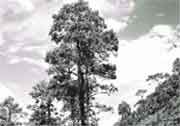Silent invasion
 askot sanctuary in Kumaon, Uttar Pradesh, has been invaded by non-native plant species. According to scientists of the G B Pant Institute of Himalayan Environment and Development ( gbpihed ), Almora, if conservation is not taken up immediately, the sensitive balance of nature in the sanctuary may be irreversibly damaged.
askot sanctuary in Kumaon, Uttar Pradesh, has been invaded by non-native plant species. According to scientists of the G B Pant Institute of Himalayan Environment and Development ( gbpihed ), Almora, if conservation is not taken up immediately, the sensitive balance of nature in the sanctuary may be irreversibly damaged.
A team lead by scientist U Dhar surveyed part of Askot, a less well-known but important Himalayan wildlife sanctuary. "A number of non-native plants have taken root,' says Dhar. "If their population increases, they could pose a serious threat to native plant diversity.'
Environmentally sensitive areas that are rich in biodiversity are declared protected areas ( pa s). Repositories of living resources in a defined geographical area, pa s shelter native plants, animals, insects and microbes. There are some 105 pa s, covering six per cent of the geographical area occupied by the Indian Himalaya. There is little to no information on the existing biodiversity in these areas, making conservation attempts difficult.
With elevation ranging from 600 feet to 6,700 feet, Askot sanctuary is home to the endangered Himalayan musk deer, barking deer, goral, Himalayan black bear and the snow leopard.
Focusing on the native flora and forest composition, Dhar and his team found that significant changes had come about. Increase in population of non-native plants and trees that have invaded the sanctuary poses a serious problem to the native species. Among the native species, oak ( Quercus leucotrichophora and Q lanuginosa ) is the most threatened since it is also being lopped to meet local fuelwood requirements. Though a native, the population of chir pine ( Pinus roxburghii ) is increasing, threatening other native trees.
It is clear that mere notification of an area as protected is not enough. Changes in species diversity due to loss of forest cover is alarming. The scientists fear that it will lead to a new biodiversity regime. "It's a case of survival of the fittest,' explains Dhar. "Cut a tree and the associated elements of the ecosystem
